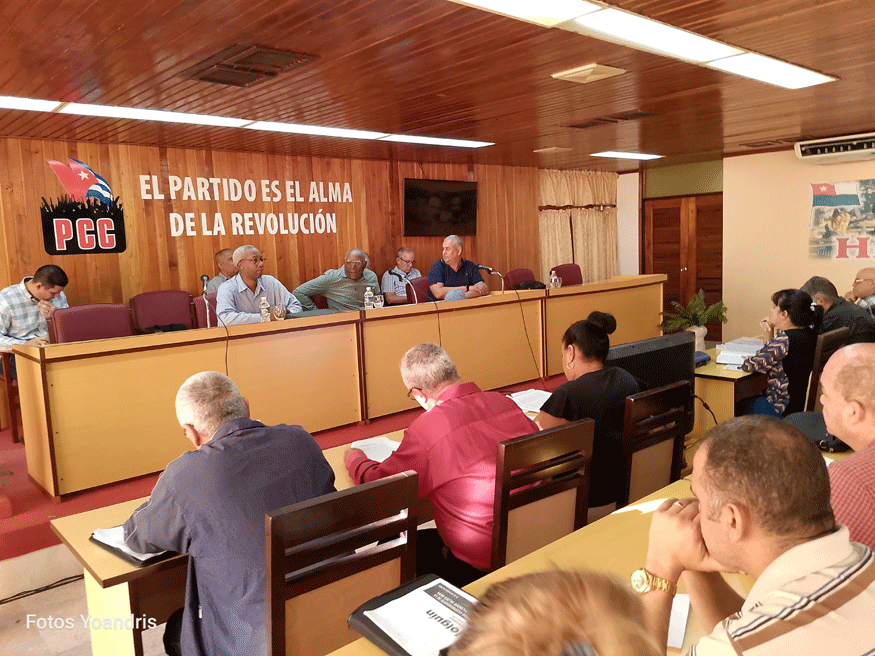The member of the Political Bureau and vice president of the Republic of Cuba, Salvador Valdés Mesa, made a working visit to Holguín province, where he checked several issues and agri-food programs of interest for the population.
Here he was interested in the beginning of the coming cold season, the sugarcane yields and the update of the preparations to face the sugar harvest.
He also analyzed the deficient indicators in the production of food, the strategies of the Ministry of Agriculture in this territory, the collection of milk and meat and their delivery to the industry, social indiscipline, non-compliance in production, as well as the theft and slaughter of cattle, in addition to the theft and slaughter of large livestock.
The vice-president was accompanied by the member of the Central Committee and first secretary of the Communist Party of Cuba in Holguin, Joel Queipo Ruiz; Manuel Hernández Aguilera, deputy to the National Assembly of the People’s Power and governor of the province; together with officials from the Ministry of Agriculture, the Ministry of Domestic Trade and the Azcuba group, among other economic organizations.
Undoubtedly, agriculture demands a greater effort in its management, thus, Valdés Mesa insisted on renewing the sowing methods, to ensure that there is more food on the table.
Valdés Mesa called attention to the non-compliance in the delivery of milk, the non-payment of vital foodstuffs to farmers, the delivery of meat to the industry, an aspect that is still unfulfilled to date.
In relation to the theft and slaughter of livestock, the president mentioned its increase in this province, a phenomenon that is worsening, and the mortality rate of the animals is set at 60 percent, of which only six percent of the total deaths corresponded to calves, which reflects a figure of 18,000 dead calves.
On this same theme, he was also interested in the reproduction and birth rate of the livestock, an aspect that is growing by more than two thousand births with respect to the previous year, thanks to an exhaustive control with actions by the Delegation of Agriculture in Holguín.
The vice-president asked for an account of the preparations to face the cold season, which has some 16,600 hectares for the sowing of foodstuffs.He mentioned that the municipalities of Gibara, Antilla, Báguanos and Holguín are the territories that demand more support, regarding the delivery of extra-dense bananas, as rustic crops of high demand among the people of Holguín.
Queipo Ruiz informed the Vice-President of the Republic that the province of Holguin has a high demand of bananas, of Holguin treasures a bank of seeds of diverse crops to face the coming cold planting campaign, but keeping an eye on various crops.
Regarding the sugar harvest, Azcuba’s directors informed that the start-up of the milling is set for December 22 at Fernando de Dios sugar mill, in the town of Tacajó.
Repairs and finishing touches should be completed by the 27th of this month, although they have identified a seven-day delay in the preparation work.
The areas requiring the most attention are the mills, mats, vasculator, collection center, conveyors, steam generation, boiler house and boiler house.
They also explained that for the harvest, in Holguín, they have 45 sugarcane harvesters with the technical with the corresponding technical review, which will be in charge of the harvest. There are 145 trucks and tires available to guarantee the harvest.
The Cuban Railroad Union has six locomotives and 232 cars, including the restructuring of some 50 railroad trailers, which demand the sum of seven million pesos for the for the purchase of the gases without any difficulty.
The vice-president finally learned that more than 14,000 tons of alcohol will be processed at Cristino Naranjo sugar mill, in Cacocum, which is scheduled to start up in the first days of January, where a successful alcohol and molasses production is foreseen.
In his conclusions, Valdés Mesa emphasized another management model that is more efficient than the existing ones, to increase food production and to achieve greater control of resources, their commercialization and knowledge of the final destination.
With information by Yoandris Cedeño Fonseca.
- Installation of Photovoltaic Systems in Rural Communities in Holguin - 19 de January de 2026
- 39th City Salon Opens in Holguin - 19 de January de 2026
- Habanos Festival Among Cuba’s Most Important Tourism Events - 19 de January de 2026

